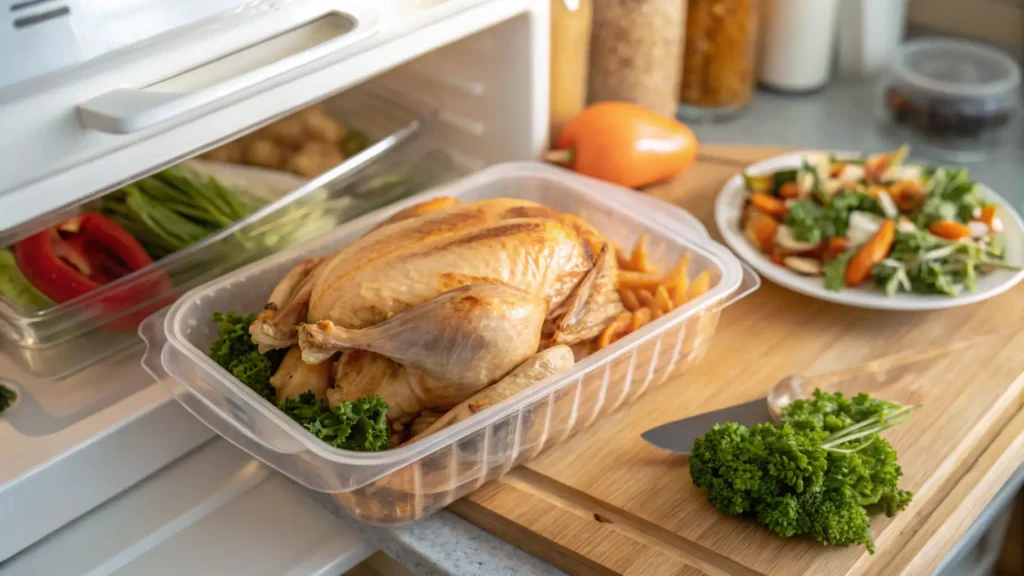Store-bought rotisserie chicken is a convenient and delicious meal option that many people enjoy. However, if you’ve ever bought more than you could eat or want to store leftovers for later, you may wonder: Can pre-cooked chicken be frozen effectively? Freezing can help preserve grilled chicken for extended periods, but it also has its challenges. While freezing can lock in freshness and prevent food waste, it may also alter the taste and texture of the meat. In this article, we will explore the pros and cons of freezing shredded chicken, providing you with valuable information to help you decide if this method of preservation works for your needs.
Table of Contents
The Pros of Freezing Rotisserie Chicken
- Convenience: Freezing pre-cooked chicken allows you to store extra portions for later, making it a practical solution for busy days.
- Reduced Waste: If you have leftover grilled chicken, freezing it prevents it from going to waste.
- Long Shelf Life: When properly stored, frozen store-bought rotisserie chicken can last for months without spoiling.
The Cons of Freezing Rotisserie Chicken
- Changes in Texture: The freezing process can affect the texture, especially when reheating, which may not be as appealing as fresh rotisserie chicken.
- Loss of Moisture: If not stored correctly, freezing can cause the chicken to dry out.
- Flavor Alterations: Freezing and reheating may result in flavor changes, which could affect your eating experience.
Can You Freeze Rotisserie Chicken?
Yes, pre-cooked chicken, including rotisserie chicken, can be frozen effectively, but proper handling is essential to maintain its quality. Freezing is a convenient way to extend the shelf life of leftover grilled chicken, preventing food waste and saving time for future meals. However, while freezing does not ruin pre-cooked chicken outright, it can sometimes alter its taste and texture if not done correctly.
One potential drawback of freezing rotisserie chicken is that the freezing process can cause moisture loss, leading to a drier texture when the chicken is reheated. Additionally, the breakdown of the chicken’s fibers during freezing may result in a slightly rubbery or less tender consistency. The flavor of the chicken may also become muted if it wasn’t well-seasoned before freezing, or if it remains in the freezer for too long.
To minimize these issues, proper storage techniques are crucial. Using airtight packaging, such as freezer-safe bags or vacuum-sealed containers, helps prevent freezer burn and preserves both the flavor and texture of the chicken. Labeling and dating the packaging ensures you use it within the recommended timeframe of 3 to 4 months for optimal quality.
Below, we’ll explore how freezing affects shredded chicken’s safety and provide tips to preserve its deliciousness!
How Freezing Affects Rotisserie Chicken’s Taste and Texture
Freezing pre-cooked chicken may impact its texture and taste, but the extent of these changes depends on various factors. First, freezing breaks down the structure of the chicken’s fibers, which can result in a more rubbery or dry texture when reheated. In addition, the flavor of the grilled chicken may become slightly muted, especially if it wasn’t properly seasoned or if it sat in the freezer too long.
However, if done correctly, the changes in texture and taste can be minimal. To prevent the worst of these issues, proper storage and freezing techniques are crucial.
Is It Safe to Freeze Rotisserie Chicken?
Yes, it is generally safe to freeze grilled chicken, including store-bought rotisserie chicken, as long as you follow proper food safety practices. The key to safely freezing pre-cooked chicken lies in how it is handled before and during the freezing process. Improper handling can lead to contamination or spoilage, which can compromise the quality and safety of the chicken.
To ensure safety, always freeze rotisserie chicken within two hours of cooking or purchase. This minimizes the risk of bacterial growth, especially harmful pathogens like salmonella or listeria. If the chicken has been left at room temperature for longer, it’s best not to freeze it. Before freezing, allow the chicken to cool to room temperature, as placing hot food directly in the freezer can raise the internal temperature, affecting other frozen items.
It’s also crucial to set your freezer to 0°F (-18°C) or lower, as this temperature effectively halts bacterial activity and preserves the chicken. Use airtight packaging, such as freezer-safe bags or vacuum-sealed containers, to prevent freezer burn and maintain the chicken’s flavor and texture. By following these steps, you can confidently freeze and later enjoy your rotisserie chicken without compromising safety or quality.
Best Practices

To ensure that your pre-cooked chicken remains in optimal condition after freezing, follow these best practices. Proper freezing is essential for preserving the taste and texture of the meat.
Yes, rotisserie chicken stays delicious after freezing if you store it in airtight packaging and use it within 3 months! When you’re ready, try it in Leftover Rotisserie Chicken, mix it into a fresh Cowboy Caviar Salad.
How to Properly Store Rotisserie Chicken in the Freezer
Proper storage is key to maintaining the quality of your frozen rotisserie chicken. Here are some steps to follow:
- Cool the Chicken: Allow the chicken to cool to room temperature before freezing. This helps prevent ice crystals from forming inside the meat.
- Use Airtight Packaging: Wrap the chicken tightly in plastic wrap or aluminum foil, followed by a layer of freezer-safe plastic bags or airtight containers. This will protect the chicken from freezer burn.
- Label and Date: Always label the packaging with the date of freezing so you can keep track of how long it has been stored.

Whole vs. Shredded Chicken: Which Freezes Better?
Both whole and shredded pre-cooked chicken can be frozen, but the way they are frozen may affect their quality. Whole grilled chicken can be frozen with the skin on, which helps to retain moisture. However, shredded store-bought rotisserie chicken tends to freeze better because the smaller pieces thaw more evenly and quickly.
- Whole Chicken: Freezing whole chicken is fine, but be aware that the skin may become rubbery when reheated.
- Shredded Chicken: Shredding the chicken before freezing helps prevent dryness and ensures quicker and more even reheating.
How Long Can You Keep Rotisserie Chicken in the Freezer?
The length of time rotisserie chicken can be kept in the freezer plays a role in how good it will be when reheated. Freezing chicken for too long can lead to freezer burn and a significant loss of flavor.
Ideal Freezing Time for Optimal Quality
For the best quality, pre-cooked chicken should be consumed within 3 to 4 months of freezing. After this time, the chicken is still safe to eat if stored properly, but the texture and flavor will begin to degrade.
How to Avoid Freezer Burn and Preserve Flavor
Freezer burn occurs when the chicken is exposed to air, causing dehydration and spoilage. To prevent freezer burn:
- Use airtight containers or vacuum-sealed bags for optimal protection.
- Make sure there is as little air as possible inside the storage container.
- Label the package with the date to ensure you consume the chicken before it loses its quality.
How to Thaw and Reheat Frozen Rotisserie Chicken
Proper thawing and reheating methods are essential to preserving the flavor and moisture of frozen rotisserie chicken. Here’s how to do it correctly.
Best Methods for Thawing Frozen Rotisserie Chicken
There are several ways to safely thaw frozen rotisserie chicken, but the best method depends on your available time:
- Refrigerator Thawing: The safest method is to place the frozen chicken in the refrigerator for 12 to 24 hours. This allows it to thaw gradually, preventing bacterial growth.
- Cold Water Thawing: If you’re in a hurry, you can place the chicken in a sealed plastic bag and submerge it in cold water. Change the water every 30 minutes until thawed.
How to Reheat Frozen Rotisserie Chicken Without Losing Moisture
To prevent dried-out chicken when reheating, follow these tips:
- Oven Method: Preheat the oven to 350°F (175°C), cover the chicken with foil, and heat for 20-30 minutes, depending on the size.
- Stovetop Method: Heat the chicken in a skillet with a bit of water or broth to maintain moisture, covering it with a lid.
Is the Taste and Quality of Rotisserie Chicken the Same After Freezing?
While freezing rotisserie chicken can preserve its safety, taste and quality may change once it is thawed and reheated.
Flavor and Texture Changes After Freezing and Reheating
After freezing and reheating, the chicken’s flavor may become slightly bland, and the texture might not be as juicy as when it was first cooked. The skin may lose its crispness, and the meat could become rubbery. These changes are more noticeable with longer freezing times or improper storage.
How to Improve the Taste of Frozen Rotisserie Chicken When Reheated
If you’re concerned about the taste and texture of frozen rotisserie chicken, there are ways to improve it:
- Add Fresh Seasoning: Enhance the flavor by adding fresh herbs, spices, or marinades after reheating.
- Moisture Boost: Reheat the chicken in a sauce or broth to keep it moist and add flavor.
Frequently Asked Questions About Freezing Rotisserie Chicken
Does Freezing Rotisserie Chicken Affect Its Nutritional Value?
No, freezing rotisserie chicken does not affect its nutritional value significantly. The protein content and other nutrients remain intact, though the texture may change.
Can You Freeze Rotisserie Chicken with Skin On?
Yes, you can freeze rotisserie chicken with the skin on. However, keep in mind that the skin may lose its crispness when reheated.
Can You Refreeze Rotisserie Chicken After Thawing?
It is not recommended to refreeze rotisserie chicken once it has been thawed, as it can affect the texture and increase the risk of bacterial contamination.
How Can I Tell If Frozen Rotisserie Chicken Has Gone Bad?
Signs that frozen rotisserie chicken has gone bad include:
- A foul odor after thawing.
- Discoloration, such as brown or gray spots.
- Ice crystals forming inside the packaging, indicating freezer burn.
By following these guidelines and best practices, you can enjoy pre-cooked chicken that’s been frozen without sacrificing too much of its quality. However, keep in mind that the answer to Is grilled chicken good after freezing? depends largely on how well you handle it throughout the freezing, thawing, and reheating process.
Summary and Practical Tips
In conclusion, freezing pre-cooked chicken is a practical and effective way to extend its shelf life, allowing you to enjoy a convenient meal at a later time. While the freezing process can cause some changes to the taste and texture, proper storage, and reheating techniques can help minimize these effects. By following best practices for freezing, thawing, and reheating, you can preserve the chicken’s nutritional value and reduce waste, making it a viable option for busy households.
However, it’s important to be mindful of factors like freezer burn, changes in moisture, and potential flavor loss when freezing grilled chicken. By freezing it within the recommended timeframe and avoiding refreezing, you can ensure the chicken stays safe and as flavorful as possible.
So, is store-bought rotisserie chicken good after freezing? Yes, with the right handling, it can be a convenient and tasty meal option for later.



